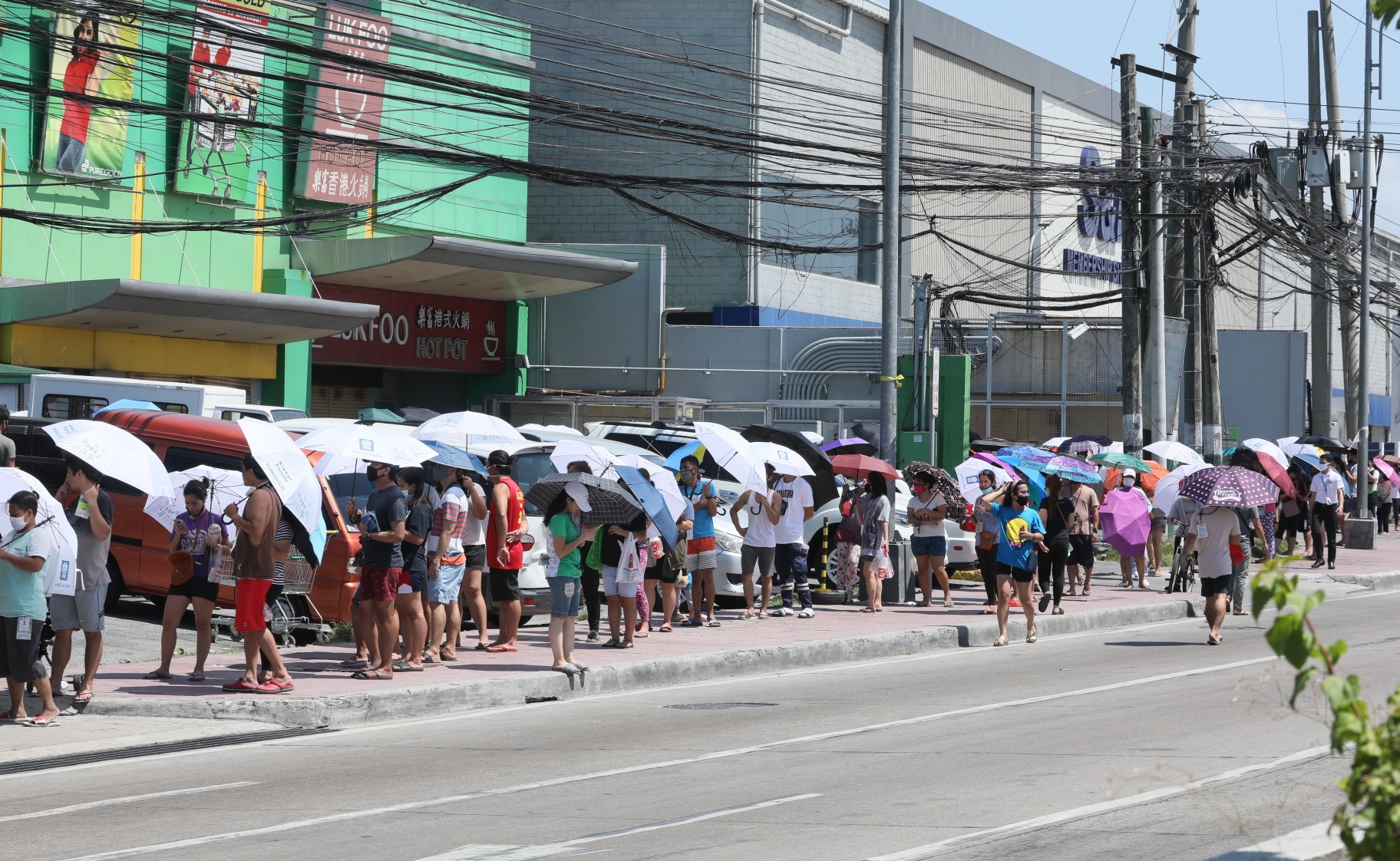News
Basic income approach to cover middle class in cash aid pushed

FILE: People have to endure the summer heat before they could enter a supermarket at Barangay Sto. Niño, MIA Road in Parañaque City on Sunday (March 29, 2020). (PNA photo by Avito C. Dalan)
MANILA – The chairman of the House ways and means committee on Tuesday proposed a universal basic income approach that would cover 90 percent of the country’s population.
Albay Rep. Joey Salceda said the UBI approach proposes that “all Filipinos except those in the top 10 percent” of the population would receive between PHP1,000 and PHP2,000 each in emergency assistance during the enhanced community quarantine (ECQ).
Salceda said coverage would include the middle class, noting that the approach would do away with “convoluted eligibilities”, make for faster distribution, and ensure accountability.
“I asked the President (Rodrigo Duterte) to consider a basic income approach to distributing the emergency subsidy.
Essentially, you distribute PHP1,000 to PHP2,000 pesos per head. Bale ang eligibility lang po, basta Pilipino ka at hindi ka mayaman, makakatanggap ka ng tulong (The eligibility is that if you are a Filipino and you are not rich, you will receive aid),” he said.
“Ang tingin ko po kasi, batay na rin sa mga pag-aaral natin ng welfare systems ng ibang bansa, at batay sa model halimbawa ng Covid subsidy sa America, pinaka straightforward at simple ang basic income. Walang duplications at walang confusion sa eligibility (What I think is, based on our study on the welfare systems of other countries, and based on the model of Covid-19 subsidy in America, the straightforward and simple way is basic income. There are no duplications and no confusion about the eligibility),” he added.
Salceda noted that the costs of the basic income approach may be cheaper, as it would only require PHP198.2 billion to cover 90 percent of the population, while PHP176.2 billion would be required to cover 80 percent.
“Basic income would be easier to target (i.e., if you are wealthier than 80 percent of Filipinos, you will not receive it. Otherwise, you are entitled). It would entail less administrative costs as it would not require the kind of data mining required of identifying beneficiaries from existing but disjointed lists,” Salceda said in his letter to President Duterte.
“A basic income approach would also be easy to distribute (in some of the poorest barangays in the country, all citizens would qualify). An open application system would be much simpler. As an entitlement earned by the simple virtue of citizenship and income, it would be depoliticized. It also does away with overlaps where households qualify under two or more bases for entitlement,” he added.
Finance Secretary Carlos Dominguez III, however, noted that people from the middle class are included in measures extended to those affected by the coronavirus disease 2019 (Covid-19).
Dominguez said the government has a PHP205-billion program to be used for more than two months “to provide support for those in the informal sector, in addition to fully funding the needs of the health care sector.”
Dominguez said the funds would be reallocated for assistance to local governments, the micro, small and medium enterprises (MSMEs) by subsidizing the salaries of their employees who are mostly what some would call lower middle class, and support the Department of Agriculture/Department of Trade and Industry in enhancing food production and availability.
He noted that aside from the support to the middle class coursed through the MSME sector, the Bangko Sentral ng Pilipinas (BSP) and the Securities and Exchange Commission (SEC) have also implemented such measures as the moratorium on the payment of loan and credit card amortizations, and prohibited the charging of compounded interest and penalties during the ECQ.
These are on top of the total of 75-basis-point cut in BSP’s key policy rates and the 200-basis-point reduction in universal and commercial banks’ (U/KBs) reserve requirement ratio, with the latter seen to boost domestic liquidity to support economic activities.
“These measures favor all sectors of society, (e)specially those some people call middle class,” Dominguez said.





















